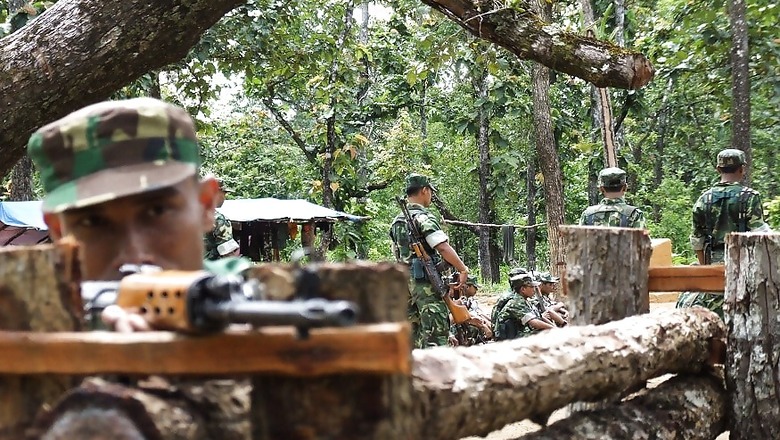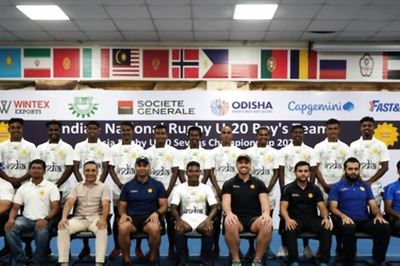
views
Myanmar has handed over 22 militants to India in an unprecedented development triggering speculation of a policy shift towards separatist rebels from the Northeast in the neighbouring country.
The rebels belong to four active separatist outfits from the Northeast — UNLF, PLA, KYKL, PREPAK (Progressive) — and the NDFB which had already inked an agreement with the government last January.
Four cadres in the group are affiliated to the Kamatapur Liberation Organisation (KLO), which was active in north Bengal years ago but is almost non-existent now. It was actively supported by ULFA during the 1990s when rebel camps were in existence in southern Bhutan.
All the militants who were handed over had served jail sentences after being apprehended in January last year at Taga in Myanmar’s Hukwang Valley following an operation by the Tatmadaw (Myanmar military). There were no clashes during the raid nor any casualties although 24 militants from different outfits were nabbed and sent to jail.
“There is hope of similar episodes in the future. The real challenge is to convince Tatmadaw to unleash a more aggressive policy in the future,” an official said, adding that two ULFA cadres apprehended at Taga were released from jail earlier.
No Senior Leaders Apprehended
The episode marks a good beginning and a triumph for the Indian government in its efforts to convince Naypyidaw to eliminate the camps and training facilities of Northeast rebels. Some observers also feel that it is an indication of the growing cooperation between the two neighbours to put an end to militancy.
The latest incident comes almost a year after an operation in south Mizoram when the Indian army made additional deployment to assist the Assam Rifles to prevent Myanmarese rebels and refugees from sneaking into India.
However, the 22 rebels are mostly middle-rung cadres who had been living in Myanmar for the past 10 years. Currently, over 6,000 cadres belonging to ULFA and six separatist outfits from Manipur’s Imphal are still at different locations in the neighbouring country.
Inputs suggest that only three senior leaders from these outfits are currently in Myanmar while the rest operate out of hideouts from different countries. Among the three, one leader stays in a locality inhabited mostly by residents from another country some of whom are also engaged with an intelligence agency.
Since the raid at Taga last year, the rebel groups have been compelled to scout for safer areas in Myanmar. Sources said that cadres from at least two outfits have taken to farming in plots of lands either leased from locals or sanctioned by the Tatmadaw in sparsely populated areas.
Signs of Change?
Among the neighbouring countries, only Myanmar had been reluctant to crack the whip on the rebel groups from the Northeast for several reasons including paucity of resources. Currently, for the Tatmadaw, it is more important to sustain the operations against the Arakan Army in Rakhine State and other outfits in the disturbed Shan State bordering China.
None from the group who had been handed over had been apprehended from any of the camps or hideouts still intact in Sagaing Division and Chin State of Myanmar.
New Delhi has been making a case for more operations and especially against the independent faction of ULFA which has a presence in the Konyak and Pangmi Naga regions in Sagaing Division contiguous to the eastern districts of Nagaland and Arunachal Pradesh.
The movement of army columns had been reported from Konyak villages of Chenhoyat and Niensing close to the Indo-Myanmar border two months ago but they did not dismantle the camps located in remote hilly locations. A Naga activist from Dimapur had also issued a press release alleging human rights abuses by the army.
It may be too early to say if this incident marks a policy shift in Myanmar towards the Northeast rebels. But there is a high possibility now of more rebels being handed over if they are apprehended in the future. Certainly, the mistrust that once marked the ties between the armies of the two countries seems to be withering.
The likelihood of the chapter in 2001 being repeated is also less when UNLF chairman Sana Yaima was reportedly taken into custody by the Tatmadaw but released within a few weeks. Requests from New Delhi to hand him over were rejected.
And contrary to media reports, Tatmadaw had turned down requests from the Indian army to join hands during Operation Golden Bird conducted in 1995 in Mizoram to prevent a large squad of rebels from ferrying weapons received in Bangladesh.
A section of government officials is of the view that ‘patience’ is the key to deal with Tatmadaw since it cannot be expected to conduct operations similar to Bhutan where all the camps belonging to ULFA, NDFB and KLO were demolished within a week in 2003.


















Comments
0 comment